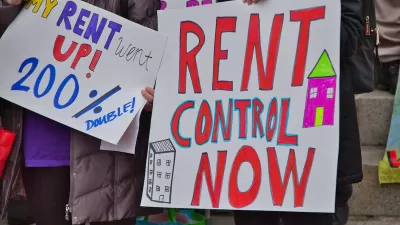Enacted in 2015, Berlin's "Mietpreisbremse" ordinance limits rent increases on some (but not all) apartments. According to this study, results have not been ideal.

"While there's broad agreement among economists that rent control is ineffective and even counterproductive, it still seems like a tempting and direct solution to the problem. What happens when a big city imposes rent control?"
Joe Cortright looks at a study on Berlin's attempt to tamp down rents. Like many U.S. cities, Germany's capital has seen rents rise lately. But in Berlin, a full 85 percent of households are rentals. That means a lot more support for pro-renter policies.
Called Mietpreisbremse (a "brake on rents"), "Berlin's rent control ordinance is a complex one: it's not a freeze on rents per se, but rather a limit on rent increases on existing rental units." Complex rules govern which apartments the law covers.
The policy hasn't been that successful. "The key finding of the Thomschke paper is that the initial enactment of the law has reduced rents in rent-controlled flats compared to those not included in the scheme, but the effects have been less than the law intended." In fact, the law tended to lower prices only on luxury apartments. That ironic result, Cortright says, is "a stark reminder that while posed as a way of promoting affordability for low income households, in practice, rent control may actually provide greater benefits for higher income renters."
FULL STORY: Does rent control work? Evidence from Berlin

Planetizen Federal Action Tracker
A weekly monitor of how Trump’s orders and actions are impacting planners and planning in America.

Congressman Proposes Bill to Rename DC Metro “Trump Train”
The Make Autorail Great Again Act would withhold federal funding to the system until the Washington Metropolitan Area Transit Authority (WMATA), rebrands as the Washington Metropolitan Authority for Greater Access (WMAGA).

The Simple Legislative Tool Transforming Vacant Downtowns
In California, Michigan and Georgia, an easy win is bringing dollars — and delight — back to city centers.

The Small South Asian Republic Going all in on EVs
Thanks to one simple policy change less than five years ago, 65% of new cars in this Himalayan country are now electric.

DC Backpedals on Bike Lane Protection, Swaps Barriers for Paint
Citing aesthetic concerns, the city is removing the concrete barriers and flexposts that once separated Arizona Avenue cyclists from motor vehicles.

In These Cities, Most New Housing is Under 441 Square Feet
With loosened restrictions on “micro-housing,” tiny units now make up as much as 66% of newly constructed housing.
Urban Design for Planners 1: Software Tools
This six-course series explores essential urban design concepts using open source software and equips planners with the tools they need to participate fully in the urban design process.
Planning for Universal Design
Learn the tools for implementing Universal Design in planning regulations.
Smith Gee Studio
City of Charlotte
City of Camden Redevelopment Agency
City of Astoria
Transportation Research & Education Center (TREC) at Portland State University
US High Speed Rail Association
City of Camden Redevelopment Agency
Municipality of Princeton (NJ)





























